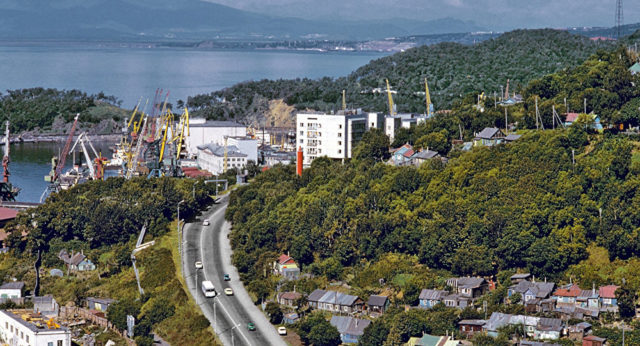
Regionalism in Russia: Western Broadcasts and Moscow’s Concerns
Publication: Eurasia Daily Monitor Volume: 14 Issue: 145
By:

Former Soviet president Mikhail Gorbachev said, last October, that there are “many Catalonias” within the borders of the Russian Federation, areas defined by intensifying regional identities in opposition to Moscow (Charter97, October 10). Some in the regions and a few in Moscow actually argue that the country would be better off if these regionalist movements flourished and contributed to a restructuring of or ending the Russian state (Ixtc.org, October 10). But not surprisingly, many in the Russian government are alarmed at such a prospect; and as usual, they suspect that the hand of the West is behind this new trend (see EDM, July 19).
Nonetheless, this recognition of the power of regionalism is significant—as is the recognition of the power of the narcissism of small differences on which it is often based, among peoples that others assume are far more uniform and united. Indeed, that significance is particularly striking at a time when the Kremlin is doing what it can to crush the elites of the existing Russian republics and regions. And they provide new evidence for the argument this author made at the end of 2016, on the After Empire portal, that “Regionalism is the nationalism of the next Russian Revolution,” particularly because regions, unlike existing republics, krais and oblasts, are far more likely to arise from below rather than be imposed from above (After Empire, December 28, 2016).
For historical reasons, tracking the development and activities of regionalism and regionalists in Russia has always been more difficult than following those of non-Russian nationalities. The latter are, to one extent or another, part of the system and have their own institutions, while the former all too often do not. But tracking regionalism has been made easier by the editors of the After Empire portal (Afterempire.info, accessed November 9), by those at the Free Ingria organization (Freeingria.org, accessed November 9), and by its analogue for the Urals region, the Free Ural online portal (Freeural.org, accessed November 9).
One of the first posts on this new site is entitled “Is Moscow Afraid of the Urals Republic?” And the article argues that the central government is clearly fearful of this long-proposed regionalist project. Notably, the government put one activist in a psychiatric prison for backing the Urals Republic idea; and in the last year alone, the central authorities closed down 13 VKontakte groups that were promoting this notion (Freeural.org, October 11).
Moscow is alarmed by the support the idea of a Urals Republic now has. In fact, that support has been growing as the economic crisis grows worse, and as Moscow takes more and more from the people of the region and gives back less and less. In recent years, the Russian government has deployed its propaganda machine against Urals activists on a regular basis (Ura.ru, October 12, 2016). And it has launched an expanded campaign to link all domestic regionalist groups—especially those in Siberia and the Russian Far East (Kommersant, June 27)—to Western intelligence services, thus putting those who take part in them at risk of prosecution (Windowoneurasia2.blogspot.com, June 28).
The actual role of the West in these movements is minimal or non-existent. Only once in the history of Western broadcasting to Eurasia did the United States even broadcast to a region not defined as one by Moscow but rather by the population there itself. That was in 1985–1986, when Radio Liberty broadcast in Ukrainian to the Russian Far East—a region known to Ukrainians as “the Green Wedge” because so many ethnic Ukrainians settled there at the end of the tsarist period (Euromaidan Press, February 17, 2016).
Not surprisingly, regionalists recognize that the West is not going to become involved on their behalf. In a new post on the Free Ural portal, the editors point this out and say that the people of the Urals region and those of all the other regions of Russia must rely on themselves rather than count on anyone else. “The West is not coming,” they say. Regionalists “can only place their hopes in themselves” (Freeural.org, November 9).
But now, many in Moscow are going to reach a wholly different conclusion as a result of the launch, by Radio Free Europe/Radio Liberty, of a new portal called Siberian Realities. That portal, like others directed to parts of the former Soviet Union, not only aims to provide news and information about parts of that world often neglected by outsiders, but also for people who live in these regions yet lack any region-wide publications or websites. As a result, Siberian Realities will, in the words of one of the first people to post on this new site, give the people of Siberia “a new voice” (Sibreal.org, November 6).
In the few weeks that Siberian Realities has been in operation, Russian search engines have continued to list its articles, guaranteeing that more Siberians will learn about its operation. The central Russian government has not yet taken the steps it has against other sites whose content it does not like. But both of those trends bear watching because they could be easily reversed. And that is especially likely if the site begins to post more responses to its coverage from the region, something it is only beginning to do with messages like one from a Kamchatka caricaturist who says that drawing Putin is “boring” (Sibreal.org, November 3).
The leaders of the Free Urals portal are right: the West is not coming to support the regionalists—at least not in the way that some of them might like. But Moscow is unlikely to see it that way for long, especially now that Radio Liberty, long a bugbear for the Kremlin, has gotten involved in the way that it has.



